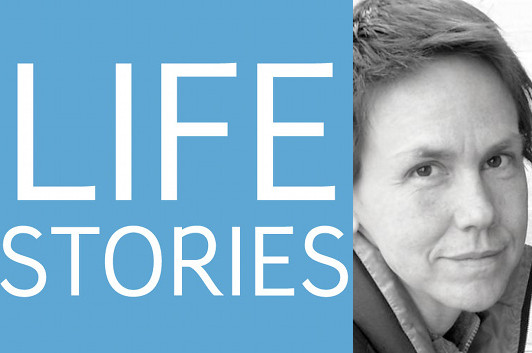Life Stories #76: Kelly Cogswell
Subscribe to Life Stories in iTunes
In this episode of Life Stories, the podcast where I interview memoir writers about their lives and the art of writing memoir, I’m joined by Kelly Cogswell, one of the earliest members of the first chapter of the Lesbian Avengers, founded in New York City in 1992. In Eating Fire, she talks about how this activist group sought not only to instigate improved conditions for lesbian women, but to transform the way they viewed themselves—one of the reasons she decided to become involved, she says, was to bring herself to become more comfortable with identifying as a lesbian:
“It was hard to come out. I didn’t have any trouble really accepting that I liked girls, but understanding what society thinks of you once you kind of accept it yourself, and want to publicly be yourself? That’s a different ball game. It’s hard.”
In our conversation, Cogswell and I discuss the issues and campaigns that brought the Lesbian Avengers together, as well as the internal conflicts that derailed the New York chapter’s momentum even as the organization itself was attracting members around the world—and how what was partially intended as a handbook for organizing direct action campaigns using the Avengers’ work as a historical example took on an increasingly personal component. We also talk about what’s changed for lesbians and the rest of the LGBT community in the two decades since the Avengers assembled, and why things like Russia’s homophobic repressions and Alec Baldwin’s insults matter.
Listen to Life Stories #76: Kelly Cogswell (MP3 file); or download this file by right-clicking (Mac users, option-click). Or subscribe to Life Stories in iTunes, where you can catch up with earlier episodes and be alerted whenever a new one is released. (And if you are an iTunes subscriber, please consider rating and reviewing the podcast!)
21 July 2014 | life stories |
Alone at the End of the World: Edan Lepucki’s California
Frida and Cal are riding out the decline of civilization in a remote forest home. When they fled Los Angeles, things had gotten so bad that the last superstore open for business was only accepting gold, “and not jewelry—it had to be melted down already.†The early stages of disaster are revealed in fleeting backward glimpses: LA was brought down by an earthquake that left “collapsed houses and condemned schools everywhere, and the 101 severed in two at the 110,†while Cleveland had been taken out by a mega-snowstorm. But the how and the why of the end of the world are secondary matters where debut novelist Edan Lepucki is concerned. She brings a much more intimate focus to California, zooming in on Cal and Frida as the world (and the past) they left behind proves less distant than they’d thought.
California is a novel of secrets and slow reveals, and it’s hard to say much about what unfolds without giving away key surprises. The young couple think they’re alone in the forest. The one neighboring family is gone, and their only contact now is with a wandering junk peddler named August. Yet Cal does, in fact, know that the outside world is not so far away; he’s simply made a point of avoiding it, until Frida tells him she’s pregnant and they decide they have to make an attempt to reach out to a community bigger than themselves, even if that community is unlikely to want them… or any other outsiders.
The surprise they find when they reach The Land, a settlement a few days’ journey away, barricaded by a maze of towering spikes constructed of seemingly random materials (reminding Frida of the Watts Towers and Cal of a crown of thorns), sets a psychological reversal in motion. Frida, who had eagerly sought out the help of others, is unsettled as she learns more about The Land’s past; Cal, who hadn’t wanted to leave their isolated safe haven, starts to reconcile himself to their new circumstances, looking for ways to work around the threats that present themselves.
Though presented as literary fiction, California reads like a vein of character-driven science fiction I first came to appreciate in the 1980s and ‘90s in outlets like Asimov’s and Fantasy & Science Fiction. The novel wears its speculative conceits lightly—and, of course, in this case the speculative conceit is the absence of futuristic technology, a world where lights powered by car batteries feel unbearably intrusive. The discoveries that Cal and Frida make about The Land are matched, perhaps even surpassed, by the discoveries that they make about each other and their capacity to keep secrets from each other, even when they’re cut off, physically or psychologically, from the rest of the world. That holds true right up to the end, as Lepucki delivers the couple to a superficially safe resting point where some readers may find the novel’s most disturbing undercurrents.
(NOTE: This post originally appeared on Beacon.)
9 July 2014 | read this |


 Our Endless and Proper Work is my new book with Belt Publishing about starting (and sticking to) a productive writing practice.
Our Endless and Proper Work is my new book with Belt Publishing about starting (and sticking to) a productive writing practice. 
